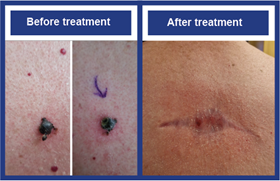A Bootle man has taken part an innovative programme using artificial intelligence (AI) to detect skin cancer earlier.
Broadgreen Hospital’s dermatology team, part of NHS University Hospitals of Liverpool (UHL) Group, partnered with Skin Analytics to implement DERM (Deep Ensemble for Recognition of Malignancy). This AI tool analyses high-resolution images of moles and lesions to assess cancer risk.
Peter Dewsbury, 55, from Bootle, noticed a skin mark on his back in 1991. Over 30 years later, it began bleeding while he was driving.
Peter said: “I never paid it much thought. It’s something I’ve had for a long time, and it never caused me any bother. But when it began to bleed, I decided to go to my GP and get it checked out.”
Referred via the two-week urgent skin cancer pathway, Peter was invited to attend a clinic for skin lesion photography.
He continued: “They used a special camera to take an image of my back, which I was told was then analysed by the technology.
“I was called back quickly, which was brilliant, and told that it needed to be removed.
“Before I even got home, the team had phoned to book me in to see a consultant face-to-face two days later and I was then booked in for my surgery.”
A week after having the lesion removed, Peter was diagnosed with skin cancer and went on to receive further surgery and treatment.

DERM is now used in community care across Merseyside to support faster diagnosis and timely treatment. NICE has granted conditional approval for NHS use, recommending continued deployment for three years while further evidence is gathered.
Broadgreen’s dermatology team was among the UK’s first to pioneer DERM at a local medical centre, integrating it into the urgent skin cancer pathway.
Peter, a serving prison officer in Liverpool, has returned to work and continues treatment.
Peter said: “I’m so thankful to all the teams who got me seen so quickly. They were brilliant throughout, and I’m proud to have been involved in this especially as it may help others like me get diagnosed earlier.”

Dr Richard Azurdia, Consultant Dermatologist said: “When referred by a primary care clinician, patients attend our photo hub where trained staff capture detailed images of skin lesions.
“These images are analysed by DERM, which classifies them by risk level which allows us to streamline those patients who then need to see a consultant dermatologist face-to-face.
“The approach supports the NHS 28-day Faster Diagnosis Standard (FDS), helping to reduce waiting times, free up specialist capacity, and offer reassurance or swift treatment where needed.”
The AI-assisted pathway has helped Broadgreen Hospital meet rising demand while maintaining high standards of care.
Dr Andrew Rose, Assistant Director of Innovation at UHL Group, added: “The development of this innovative pathway has enabled us to manage increasing demand by streamlining patients to the most appropriate point of care.
“Our success with the DERM system shows how AI tools can enhance care, support staff, and strengthen the healthcare system.
“We’re proud to be setting the benchmark for AI-enabled dermatology and look forward to expanding its impact with our partners.”
Dr Dan Mullarkey, Medical Director at Skin Analytics, said: “From early innovation through to service expansion, our partnership with UHL Group has always been focused on improving patient care.
“The successful rollout of DERM shows how AI for dermatology can ease pressure on clinical teams and deliver faster, accurate assessments for suspected skin cancer.
“It’s incredibly rewarding to see UHL Group not only realise the value of this approach but help drive its expansion to bring these benefits to even more patients.”
The NHS advises regularly checking your skin for new or changing lesions —especially those that are uneven, multi-coloured, larger than 6mm, or evolving. If you notice anything unusual, contact your GP.
Non-melanoma skin cancers are more common and usually less serious but still require medical assessment.
When holidaying in the sun, the NHS recommends using high-factor sunscreen, wearing protective clothing, and avoiding strong sunlight between 11am and 3pm
You can read more about skin care guidance on the NHS website. There is also more information available on sun safety advice.